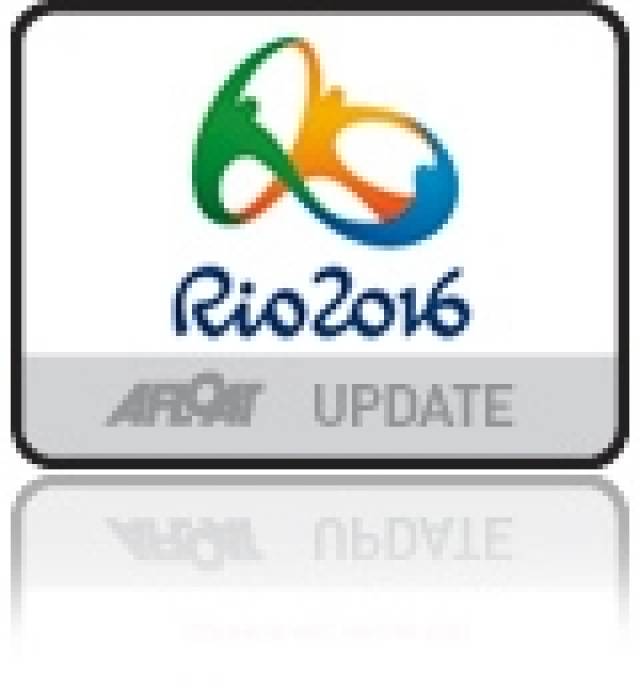#santander2014 – Belfast's James Espey is the first Irish sailor to qualify for the Rio Olympics following a fine light air performance again in Santander today when the 30–year–old Ulster man qualified for Gold Fleet racing at next week's ISAF World Cup, finshing 32nd overall, well within the top 49 cut to qualify for Rio 2016.
In further good news for the Irish team, Annalise Murphy recovered from a disappointing opening day in 86th overall yesterday in the Womens Radial division to be 58th overall after a nine and seven scored today. The result is just inside the top 60 to qualify for gold fleet racing and crucially stays on course for a Rio place next week.
Only two days into the six-day regatta and Espey has qualified for the Gold fleet in the Laser Standard class. With 22 nations being represented in the Gold fleet but a total of 23 nation places available Espey has now guaranteed Ireland a spot in Rio.
Today was an important day for the Irish Laser sailors competing at the ISAF Sailing World Championships in Santander, Spain. James Espey, Annalise Murphy and Finn Lynch each had two fleet races to sail before the Gold, Silver and Bronze splits were decided for the remainder of the regatta.
The men's Laser Standard Blue fleet had a general recall in Race 3 which delayed proceedings slightly. However a successful second attempt saw the 49 boats get a clear start over the line at 14.10. James Espey finished 33rd to sit comfortably in the top third of the 150 boat fleet in 38th. Finn Lynch finished 27th moving him up to 100th overall.
Race 4 got underway at 17.15 and Espey had another solid performance. His 15th saw him climb to 40th overall and within the top 49 which qualified him for the Gold fleet and as only 22 nations will be represented in the Gold fleet Espey has now guaranteed Ireland a spot in Rio.
Finn Lynch finished 29th, dropped one place to 101st and will now compete within the Bronze fleet.
Race 3 got underway at 13.35 CEST for Annalise Murphy and the Laser Radial Blue fleet, in light conditions. Yesterday Murphy struggled to get off the line, but today she had a great start and was free to make good tactical decisions. Drastically improving on her previous performance, Murphy finished 9th to jump up the leader board from 86th to 58th.
The female Laser competitors then had a long and frustrating wait on the water as they watched the wind completely die off. An attempt at a second race was made at 14.55 but abandoned 15 minutes later when the wind dropped to 2 knots. At 17.15 the breeze filled in to between 7-10 knots and Race 4 finally got underway. Murphy pulled in another top 10 result, finishing 7th to leap even further up the leader board to 41st overall and guaranteeing her the all-important place in the top 60 boat Gold fleet so stays in the hunt for a Rio place this week.
With 50% of Rio 2016 Olympic Sailing Competition spots available at the Santander 2014 ISAF Sailing World Championships, the fight for positions is tight, tense and tough.
After a four race qualification series, the 23 Laser places on offer at Santander 2014 have been picked up as the fleet divides up into gold, silver and bronze packs.
Twenty four nations make up the 49-boat Santander 2014 Laser gold fleet but with Brazil automatically receiving a spot as host nation the 23 Rio 2016 Olympic Sailing Competition places available at Santander 2014 have been decided:
Laser
Australia
Belgium
Canada
Croatia
Cyprus
Denmark
Finland
France
Ireland
Italy
Germany
Guatemala
Great Britain
The Netherlands
New Zealand
Norway
Singapore
Sweden
Poland
Portugal
Tunisia
USA
U.S. Virgin Islands
The next opportunity for Laser qualification will come at the 2015 Laser World Championship where nine places will be on offer. Two places are set to be awarded at each of the 2015/2016 African, Asian, European, North American and South American Continental Qualification Events. A single place will be available at the 2015/2016 Oceanic Continental qualification Event whilst Brazil, as host automatically receives a spot. Two final places will be awarded via Tripartite Commission Invitation places.
The qualification series has concluded in the Laser Radial but with 33 nations making the gold fleet and 19 Rio 2016 places available the fight will go on for three days of final series racing.
Click for the Rio 2016 Olympic Qualification System
Schedule of Racing:
12-18 September, Laser and Laser Radial
13-19 September, RS:X Men and RS:X Women
14-20 September, 470 Men and 470 Women
15-21 September, 49er, 49erFX, Finn and Nacra 17































































